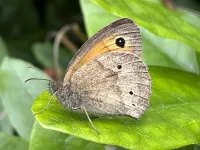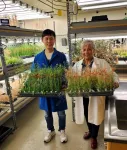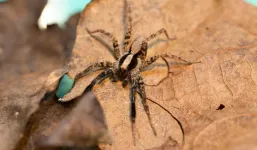(Press-News.org) People with obsessive-compulsive disorder (OCD) may have an increased risk of death from both natural and unnatural causes than those without the disorder, finds a study from Sweden published by The BMJ today.
The researchers point out that many of the natural causes of death are preventable, suggesting that better surveillance, prevention, and early intervention strategies should be implemented to reduce the risk of fatal outcomes in people with OCD.
OCD is typically a long term psychiatric disorder affecting about 2% of the population. It is characterised by intrusive thoughts, urges or images that trigger high levels of anxiety and other distressing feelings - known as obsessions - that the person tries to neutralise by engaging in repetitive behaviours or rituals - known as compulsions.
OCD is also associated with academic underachievement, poor work prospects, alcohol and substance use disorders, and an increased risk of death.
Previous studies on specific causes of death in OCD have mainly focused on unnatural causes (eg, suicide), but little is known about specific natural causes.
To fill this knowledge gap, researchers set out to estimate the risk of all cause and cause specific death in people with OCD compared with matched unaffected people from the general population and with their unaffected siblings.
Using data from several Swedish population registers, they identified 61,378 people with OCD and 613,780 individuals without OCD matched (1:10) by sex, birth year, and county of residence, and a further sibling group of 34,085 people with OCD and 47,874 without OCD.
Average age at OCD diagnosis was 27 years and groups were monitored for an average of 8 years from January 1973 to December 2020.
Overall, people with OCD had a higher death rate than matched individuals without OCD (8.1 versus 5.1 per 1,000 person years, respectively).
After adjusting for a range of potentially influential factors such as birth year, sex, county, migrant status, education and family income, people with OCD had an 82% increased risk of death from any cause.
The excess risk of death was higher for both natural (31% increased risk) and, particularly, unnatural causes of death (a 3-fold increased risk).
Among the natural causes of death, people with OCD had increased risks due to respiratory system diseases (73%), mental and behavioural disorders (58%), diseases of the genitourinary system (55%), endocrine, nutritional, and metabolic diseases (47%), diseases of the circulatory system (33%), nervous system (21%), and digestive system (20%).
Among the unnatural causes, suicide showed the highest risk of death (a nearly fivefold increased risk), followed by accidents (a 92% increased risk).
The risk of all cause death was similar in both women and men, although women with OCD had a higher relative risk of dying due to unnatural causes than men with OCD, likely due to the lower baseline risk among women in the general population, note the researchers.
In contrast, people with OCD had a 10% lower risk of death due to tumours (neoplasms).
This is an observational study, so can’t establish cause and the researchers point out that registry data only includes diagnoses made in specialist care. It’s also unclear whether the findings generalise to other settings with different populations, health systems and medical practices.
Nevertheless, this was a large study based on high quality national data, and the results remained largely unchanged after further adjustment for psychiatric conditions and family factors, suggesting that they withstand scrutiny.
As such, they conclude: “Non-communicable diseases and external causes of death, including suicides and accidents, were major contributors to the risk of mortality in people with OCD. Better surveillance, prevention, and early intervention strategies should be implemented to reduce the risk of fatal outcomes in people with OCD.”
END
Obsessive-compulsive disorder linked to heightened risk of death
Better surveillance, prevention, and early intervention strategies needed, say experts
2024-01-18
ELSE PRESS RELEASES FROM THIS DATE:
No benefit of physiotherapy over general advice after dislocated shoulder
2024-01-18
Routinely referring patients to a tailored programme of physiotherapy after a dislocated shoulder is no better than a single session of advice, supporting materials and the option to self-refer to physiotherapy, finds a clinical trial published by The BMJ today.
The findings should help clinicians and patients have informed discussions about the best approach to non-operative rehabilitation, say the researchers.
The shoulder is the most frequently dislocated joint, with rates highest in men aged 16-20 years ...
Concerns over new laws that could end use of Whatsapp in the NHS
2024-01-18
UK law changes pose a threat to the security of messaging apps – and therefore their use in the NHS. In The BMJ today, doctors warn that patient care will suffer if they can no longer use apps such asWhatsApp and Signal to share information.
In March 2020, in the face of the pandemic, clinicians were officially allowed to use messaging services such as WhatsApp “where the benefits outweigh the risk,” reversing years of caution about their use in patient care – provided ...
Fewer than 1% of schools in England have full policies on second languages, language learning and English
2024-01-18
A tiny fraction of schools in England – about three in every 500 – have whole-school policies which address foreign languages, English usage, and integrating students who speak English as an additional language (EAL), new research indicates.
The study of almost 1,000 secondary schools, by researchers at the University of Cambridge, questions many schools’ claims to being ‘inclusive’ spaces that value the linguistic diversity of their communities. It also suggests that language learning, and an appreciation of different languages, is being deprioritised, conflicting with Government ambitions for 90% of students to study a ...
Butterflies could lose spots as climate warms
2024-01-18
Female Meadow Brown butterflies have fewer spots if they develop in warmer weather – so climate change could make them less spotty, new research shows.
University of Exeter scientists found females that developed at 11°C had six spots on average, while those developing 15°C had just three.
The findings challenge long-held scientific views about why these butterflies have varying numbers of spots.
“Meadow Browns always have large ‘eyespots’ on their forewings, probably for startling predators,” said Professor Richard ffrench-Constant, from the Centre for Ecology and Conservation on Exeter’s Penryn Campus in Cornwall.
“They ...
Infusion of bone marrow mononuclear cells results in decreased intensive care needs and white matter preservation for children with severe traumatic brain injury
2024-01-18
After children experienced severe traumatic brain injury, the infusion of bone marrow mononuclear cells derived from the patient’s own bones led to less time spent in intensive care, less intense therapy, and, significantly, the structural preservation of white matter, which constitutes about half the total volume of the brain, according to new research from UTHealth Houston.
The study, published recently in the medical journal Brain, was based on the results of a Phase II clinical trial led by first author Charles S. Cox Jr., MD, the George and Cynthia Mitchell Distinguished Chair in Neurosciences and the Glassell Family Distinguished Chair in the ...
National award goes to Sandia Labs engineer
2024-01-18
ALBUQUERQUE, N.M. — Tony Garcia often reflects on his grandfather’s words: “Work hard and be good to people, and you’ll end up happy.”
This simple principle has been Garcia’s beacon throughout his academic and professional journeys, and now has led to his recognition with a prestigious 2023 Society of Hispanic Professional Engineers STAR of Today award for technical achievement.
The STAR awards recognize individuals in STEM who are not only excelling in their fields but also making a significant impact through their work, research ...
Researchers make links between woolly mammoths and colonization of the Americas
2024-01-17
Imagine journeying back in time to the era of woolly mammoths, some 14,000 years ago. That’s what a team of international researchers from the University of Ottawa, the University of Alaska Fairbanks, McMaster University and Adelphi University, and Indigenous scholars, managed to do. Using novel high-resolution isotope profiling (a sort of “paleo-GPS”), they were able to connect the dots between the wanderings of a woolly mammoth and the earliest known human settlements in the remote ...
Governor Hochul announces CUNY to receive $75 million from the Simons Foundation, largest donation in university history
2024-01-17
Governor Kathy Hochul today announced that the City University of New York is receiving $75 million from the Simons Foundation, the University’s largest-ever donation. The gift earmarks $50 million to establish CUNY as a hub for computational science and $25 million to support CUNY’s participation in the Governor’s proposed Empire AI project. Computational science uses programming techniques to solve problems in fields such as biology, astrophysics and neuroscience.
“For many New Yorkers, higher education is critical to pursuing a career ...
Keys to aging hidden in the leaves
2024-01-17
Scientists have known about a particular organelle in plant cells for over a century. However, UC Riverside scientists have only now discovered that organelle’s key role in aging.
The researchers initially set out to understand more generally which parts of plant cells control plant responses to stress from things like infections, too much salt, or too little light. Serendipitously, they found this organelle, and a protein responsible for maintaining the organelle, control whether plants survive being left too often in the dark.
Because they had not expected this discovery, which is ...
Rain can spoil a wolf spider’s day, too
2024-01-17
If you hate the rain, you have something in common with wolf spiders.
Researchers at the University of Cincinnati found that wolf spiders can’t signal others or perceive danger from predators as easily on rain-soaked leaves compared to dry ones. Even communicating with would-be mates is harder after it rains.
The study was published in the Journal of Insect Behavior.
Biologists in UC’s College of Arts and Sciences studied Schizocosa ocreata, a wolf spider found across much of the United States. Males respond to chemical signals from females by using a combination of visual ...
LAST 30 PRESS RELEASES:
Researchers develop new strategy for improving inverted perovskite solar cells
Yes! The role of YAP and CTGF as potential therapeutic targets for preventing severe liver disease
Pancreatic cancer may begin hiding from the immune system earlier than we thought
Robotic wing inspired by nature delivers leap in underwater stability
A clinical reveals that aniridia causes a progressive loss of corneal sensitivity
Fossil amber reveals the secret lives of Cretaceous ants
Predicting extreme rainfall through novel spatial modeling
The Lancet: First-ever in-utero stem cell therapy for fetal spina bifida repair is safe, study finds
Nanoplastics can interact with Salmonella to affect food safety, study shows
Eric Moore, M.D., elected to Mayo Clinic Board of Trustees
NYU named “research powerhouse” in new analysis
New polymer materials may offer breakthrough solution for hard-to-remove PFAS in water
Biochar can either curb or boost greenhouse gas emissions depending on soil conditions, new study finds
Nanobiochar emerges as a next generation solution for cleaner water, healthier soils, and resilient ecosystems
Study finds more parents saying ‘No’ to vitamin K, putting babies’ brains at risk
Scientists develop new gut health measure that tracks disease
Rice gene discovery could cut fertiliser use while protecting yields
Jumping ‘DNA parasites’ linked to early stages of tumour formation
Ultra-sensitive CAR T cells provide potential strategy to treat solid tumors
Early Neanderthal-Human interbreeding was strongly sex biased
North American bird declines are widespread and accelerating in agricultural hotspots
Researchers recommend strategies for improved genetic privacy legislation
How birds achieve sweet success
More sensitive cell therapy may be a HIT against solid cancers
Scientists map how aging reshapes cells across the entire mammalian body
Hotspots of accelerated bird decline linked to agricultural activity
How ancient attraction shaped the human genome
NJIT faculty named Senior Members of the National Academy of Inventors
App aids substance use recovery in vulnerable populations
College students nationwide received lifesaving education on sudden cardiac death
[Press-News.org] Obsessive-compulsive disorder linked to heightened risk of deathBetter surveillance, prevention, and early intervention strategies needed, say experts




